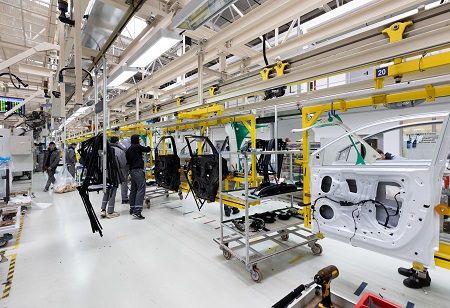
JSW Motors Explores Tech Tie-Ups with BYD, Other China EVs
- JSW Motors is in talks with BYD, Geely, Chery, Xiaomi, Nio, Li Auto, Volkswagen, and Renault
- ₹26,000 crore planned over five years; new Maharashtra factory to launch cars next year
- Electric vehicles, plug-in hybrids, and range extenders; no equity partnerships in the new venture
JSW Motors, owned by steel magnate Sajjan Jindal, is having advanced talks with several leading Chinese companies (BYD, Geely, Chery, Xiaomi, Nio Auto, and Li Auto) for platforms.
The Indian car manufacturer has set aside nearly ₹26,000 crore for investment over the next five years as it targets the competitive passenger vehicle market. JSW Motors BYD partnership marks a major China EV tech tie-up to strengthen Indian electric vehicles offerings.
JSW Motors intends to start production by next year (by June at the latest) from a new factory in Maharashtra and plans to launch 25 models by 2030. The JSW Motors EV collaboration highlights advancements in automotive technology India and EV innovation India, making it a key update in JSW Motors news.
Also, according to CEO Ranjan Nayak, the company is also considering partnerships with European automakers such as VW and Renault to further enhance access to advanced platforms and components.
Conversations with BYD, which currently imports cars into India while paying high customs duties, are still continuing. Nayak stated that JSW Motors is willing to build vehicles for BYD in Maharashtra, with planned capacity of 5 lakh units per year.
Also Read: Italy Launches First Aerospace Business Mission to India
He added, "I met the BYD teams even last month. I had talks with them... they can also leverage the Indian ecosystem in line with the shift in geopolitical dynamics. India could become an export hub for global markets. BYD can make here, localise here, and export to the US and Europe".
JSW Motors is also in a joint venture with Chinese carmaker SAIC called JSW MG Motor, but the company is not looking to give any equity to a partner.
Nayak noted, "What we are looking at through the talks with various companies is access to components, access to core tech, and (car) platforms. We want to get the technology here and localise. Brutal localisation is our aim. Whoever is aligned with this goal is someone we are ready to collaborate with. The partner will share the tech and will be paid a fee for that — upfront as well as royalty. We don’t want to be locked up with one partner".
Their product portfolio in India will consist mainly of electric vehicles, plug-in hybrids and range extender vehicles, and it intends to compete strongly in the growing EV and sustainable mobility market / segment.
"SUVs will be the preferred body type that we will target, even though there are plans for a premium sedan by around 2027. The average price of the early cars will be Rs 22-25 lakh, and after that we will enter the mass segment targeted at fleets and taxis which could be a hatchback. These mass products will be priced at Rs 8-9 lakh", Nayak stated.

.jpg)